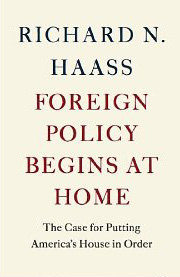Book Notes
 Richard N. Haass, Foreign Policy Begins at Home; The Case for Putting America's House in Order (New York: Basic Books, 2013), 195pp.
Richard N. Haass, Foreign Policy Begins at Home; The Case for Putting America's House in Order (New York: Basic Books, 2013), 195pp.
For almost forty years, Richard Haass has distinguished himself as one of America's foreign policy experts. He earned his PhD at Oxford and has authored or edited a dozen books. He's advised administrations in both parties. Since 2003 he has been president of the non-partisan Council on Foreign Relations. This book is one he "never imagined writing" since it argues that the biggest threats to America are domestic rather than international. We're overreaching and underperforming, and need to focus on reforming ourselves rather than remaking other countries.
Haass's book is really a long essay with three parts. Part one is a survey of global politics since 1989, a period that has produced turbulence rather than the expected "peace dividend" after the fall of the Berlin Wall. The "paramount feature" of our world is what he calls "nonpolarity." That is, there are many, diverse and diffuse actors, only some of which are states. Ours is a "post-European world" in which the rise of China is the "defining feature." The challenge of the Middle East is that America's interests there are greater than its influence. Despite a world that is messier rather than more orderly, "America still matters far more than any other nation."
In the second part, Haass argues that the United States needs to be far more selective in its foreign policy. What should define and guide a new international posture? In quick succession he explores and rejects five common suggestions — democracy or political reform, humanitarianism, counter terrorism, integration, and containment. He then argues for what he calls "Restoration." That means nation-building at home more than abroad. We should stop focusing so much on the Middle East and give more attention to the Asia-Pacific region. The tools of Restoration are the economy and diplomacy more than the military.
The third part of Haass's book then looks at rebuilding at home. He highlights five core elements — the deficit and the debt, energy, education, upgrading the country's infrastructure (roads, bridges, dams, etc.), and immigration policy. We need to be more restrained abroad and more disciplined at home, says Haass. This bird's eye view of the world is an excellent primer by a leading expert. But beyond the generalizations, the devil will always be in the details. You can only say so much about energy or immigration in a five-page chapter. Everyone agrees that we need to "reform health care" and "fix politics," but what does that mean? And how do you succeed where others have failed?
In his introduction, Haass anticipates two objections, that he'll be dismissed as a defeatist "apostle of decline," or as an isolationist. Isolationism is both a folly and impossible. America has a unique role to play, but it can only do so if it recognizes the limitations of its resources and influence. So, Restoration at home as the guide to a new foreign policy is the goal. But while this is possible, it's not inevitable. There are difficult and disciplined choices to make. If we don't make the right choices to rebuild at home, we'll continue to drift, fall into a crisis, or, worst of all, experience "faux leadership in the form of populism that would deepen social divisions without fixing problems." Stay tuned.


